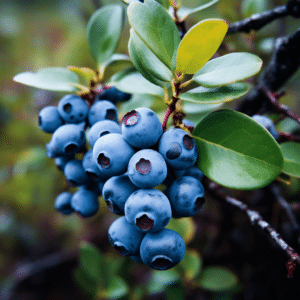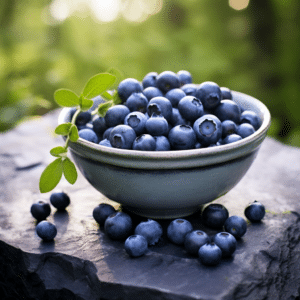Blueberries are not only delicious but also packed with numerous health benefits. Growing your own blueberry bushes can be a rewarding endeavor. This guide will walk you through the process of growing blueberries, from planting to harvesting.
Understanding Blueberry Plants

Before you start planting, it’s important to understand the nature of blueberry plants. Blueberries belong to the Vaccinium genus and are known for their love of acidic soil. They are perennial flowering plants with indigo-colored berries, which are rich in antioxidants.
There are three main types of blueberry plants: highbush, lowbush, and rabbiteye. The highbush varieties are the most common, especially in commercial production. Lowbush varieties are smaller and more resistant to cold, while rabbiteye varieties are best suited for warmer climates.
Highbush Blueberries
Highbush blueberries are the most commonly grown type in home gardens. They can reach heights of 6 to 12 feet and are known for their large, flavorful berries. These plants prefer a soil pH of 4.0 to 5.0 and require a good amount of watering.
There are two types of highbush blueberries: Northern and Southern. Northern highbush blueberries are more cold-tolerant, while Southern highbush blueberries can handle warmer climates.
Lowbush Blueberries
Lowbush blueberries, also known as wild blueberries, are smaller plants that typically grow less than 2 feet tall. They are highly cold-tolerant and produce small, intensely flavored berries. These plants are often used for ground cover and can tolerate a wider range of soil conditions than highbush varieties.
Despite their size, lowbush blueberries can produce a significant amount of fruit. They are also known for their vibrant fall foliage, making them an attractive addition to any garden.
Rabbiteye Blueberries
Rabbiteye blueberries are native to the southern United States and are more heat-tolerant than the other types. They can grow up to 15 feet tall and produce large, sweet berries. These plants prefer a soil pH of 4.5 to 5.5 and require less watering than highbush varieties.
One unique feature of rabbiteye blueberries is their late blooming period, which can extend the blueberry season. However, they require a longer growing season and may not be suitable for areas with early frosts.
Planting Blueberries

Once you’ve chosen the type of blueberry plant that suits your climate and soil conditions, it’s time to start planting. The best time to plant blueberries is in the early spring or fall. However, if you live in a warmer climate, you can plant at any time of the year.
Blueberries require full sun and well-drained soil. They prefer acidic soil with a pH between 4.0 and 5.5. If your soil is not naturally acidic, you can amend it with sulfur or use an acidifying fertilizer.
Preparing the Soil
Start by testing the pH of your soil. You can purchase a soil test kit from a garden center or online. If the pH is above 5.5, you will need to lower it by adding sulfur or an acidifying fertilizer. Follow the package instructions for the correct amount to add.
Next, prepare the planting hole. It should be twice as wide and the same depth as the root ball of the plant. Add some organic matter, such as compost or peat moss, to the bottom of the hole to improve drainage and provide nutrients.
Planting the Bush
Place the blueberry bush in the hole, making sure the top of the root ball is level with the ground. Backfill the hole with the amended soil, firming it gently around the base of the plant. Water thoroughly after planting.
After planting, apply a layer of mulch around the base of the plant to conserve moisture and suppress weeds. Pine bark, pine needles, or sawdust are all good choices for mulching blueberries.
Caring for Blueberry Plants
Blueberries are relatively low-maintenance plants, but they do require some care to produce a good crop. Regular watering, annual pruning, and periodic fertilizing will keep your plants healthy and productive.
Watering
Blueberries have shallow roots and therefore require regular watering, especially during dry periods. A good rule of thumb is to provide 1 to 2 inches of water per week. However, be careful not to overwater, as this can lead to root rot.
Using a drip irrigation system or soaker hose can help ensure consistent moisture levels. These methods also reduce water waste and prevent the spread of diseases that can occur with overhead watering.
Pruning
Pruning is an important part of blueberry care. It helps to maintain plant size, promote better air circulation, and encourage the growth of new fruit-bearing wood. The best time to prune is in late winter or early spring, before new growth begins.
Start by removing any dead or diseased wood. Then, prune out any weak or low-growing branches. Finally, thin out some of the older wood to encourage new growth. Be sure to make clean cuts and avoid leaving stubs, which can attract disease.
Fertilizing
Blueberries benefit from regular fertilizing. Use a fertilizer specifically designed for acid-loving plants, and apply according to the package instructions. Typically, you should fertilize in early spring and again in late spring to early summer.
Be careful not to over-fertilize, as this can lead to excessive leaf growth at the expense of fruit production. It’s always better to err on the side of under-fertilizing when it comes to blueberries.
Harvesting Blueberries

The moment of truth arrives when your blueberry bushes start to produce fruit. Blueberries are typically ready to harvest between June and August, depending on the variety and your climate.
Blueberries do not ripen all at once, so you’ll need to pick them several times throughout the season. The berries are ready to pick when they are fully blue and easily come off the bush when lightly tugged.
Harvested blueberries can be enjoyed fresh, frozen, or used in a variety of recipes. Whether you’re making blueberry pancakes, muffins, or just enjoying them by the handful, homegrown blueberries are a treat worth the effort.
Common Blueberry Pests and Diseases
While blueberries are generally easy to grow, they can be susceptible to certain pests and diseases. Being aware of these potential issues and knowing how to deal with them can help ensure a healthy, productive crop.
Pests
Common pests that can affect blueberries include aphids, blueberry maggot flies, and birds. Aphids can be controlled with insecticidal soap or neem oil, while blueberry maggot flies can be managed with sticky traps or beneficial nematodes.
Birds can be a major problem, as they love blueberries as much as we do. Bird netting is the most effective way to protect your crop. Be sure to secure the netting well, as birds can easily get under loose netting.
Diseases
Blueberries can be affected by several diseases, including fungal diseases like anthracnose and mummy berry, and bacterial diseases like bacterial canker. Proper plant care, including good watering practices and regular pruning, can help prevent these diseases.
If you notice any signs of disease, such as discolored leaves or stunted growth, consult with a local extension service or nursery for advice on treatment.
With a little bit of knowledge and care, growing blueberries can be a rewarding experience. Not only will you have the satisfaction of growing your own fruit, but you’ll also have a beautiful addition to your garden that provides year-round interest. Happy gardening!